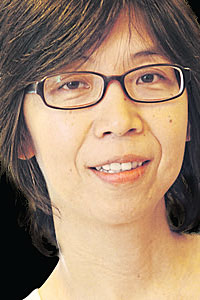I've known about the Bangmod tangerine since I was a child, and it might be the first or only orange species of which I have knowledge. Growing up in a Chinese family, we have the tradition of "wai jao" (to offer a sacrifice to Chinese gods or ancestors) many times a year and oranges are one of the important fruits that we use, not only to pay respect to the gods, but also for special occasions.
In every Chinese family, we have "tee ju ia", a small guardian spirit house situated on the grounds. At my house, I've never seen the tee ju ia missing a plate of four oranges.
Oranges were also never missing from our dining table. My mum always brought oranges as a gift when she visited relatives. Chinese people believe that the orange symbolises best wishes to others and is considered a blessing for the recipient to enjoy good health and wealth.
The Bangmod has however gradually been disappearing for many years due to the severe floods which occurred in Bangkok in 1983 and 1991. Consumers have become more familiar with other varieties of orange, like Sainamphung, and some people have turned to buy imported brands.
But I do believe that for Thai people, Bangmod is still the best in the world even though new generations of people may not even recognise it as it has rarely been available fresh or in supermarkets.
Last weekend, I had the chance to take my children on a half-day trip to Bangmod orange orchard. The trip was organised by the Kids Museum. The organising team took us to the orange orchard in Jomthong, the only district in Bangkok where Bangmod oranges are still grown. It was the first time the kids had strolled around an orange orchard. The orchard owners are a husband and wife team in their 80s who do not look their age.
They still look healthy and strong. The couple were once approached by businessmen and offered hundreds of millions of baht for the purchase of their orchard, but Prasit, the husband, said he had no idea what to do with such a huge amount of money as he only enjoys growing oranges.
I was shocked to learn he could only sell 52 kg of oranges in total last year. That's why many orchard owners sell their land to big companies. Without a true love for fruit growing, Prasit's business would not have survived.
Amid urbanisation and real-estate projects, agricultural areas in Bangkok have been shrinking very fast, but here in Jomthong, a small orange orchard has been left for the community, serving the new generation.
To buy real Bangmod oranges, consumers have to make a prior reservation a year in advance because of low yields. Orange cultivation takes nine months for each harvest.
That means growers can harvest only once a year. The best period for Bangmod oranges in terms of taste is November to December. More importantly, the oranges grown in this area are completely chemical-free.
In the past, there were some 60,000 rai of Bangmod orange orchards in Bangkok, covering Jomthong, Rat Burana, Thung Kru, Bang Khunthian and Bang Bon, according to Prayoon Wongputhakam, an agricultural expert.
Statistics by the Department of Agriculture revealed that following flooding in Thailand in 2011, Jomthong is the only area in Bangkok growing Bangmod oranges, which covers just 20 rai of land.
The oranges grown in this area are part of the plant genetic conservation project under the initiative of HRH Princess Maha Chakri Sirindhorn.
As Bangmod oranges have been brought back, Prayoon said sustainability is regarded as the most important factor. Here is organic agriculture in action, as farmers use only biological fertiliser.
Besides producing fruit for consumers, the orange orchard in Jomthong serves as a learning source for the people in the community and the new generation.
I have come to realise now why the price of oranges today are expensive and I never regret spending money on the Bangmod variety.
Sasiwimon Boonruang is a writer with Bangkok Post's Life section
